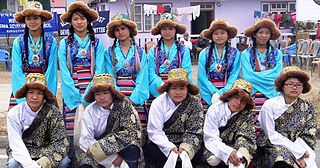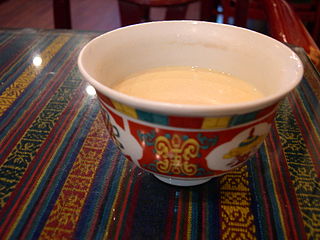Related Research Articles

The Sherpa are one of the Tibetan ethnic groups native to the most mountainous regions of Nepal, Tingri County in the Tibet Autonomous Region and the Himalayas. The term sherpa or sherwa derives from the Tibetan-language words ཤར shar ('east') and པ pa ('people'), which refer to their geographical origin in eastern Tibet.
Tashi, also spelled Trashi, is a Tibetan word meaning "good fortune" or "auspiciousness". Tashi or Trashi may refer to:

Losar also known as Tibetan New Year, is a festival in Tibetan Buddhism. The holiday is celebrated on various dates depending on location tradition. The holiday is a new year's festival, celebrated on the first day of the lunisolar Tibetan calendar, which corresponds to a date in February or March in the Gregorian calendar. In 2020, the new year commenced on the 24th of February and celebrations ran until the 26th of the same month. It also commenced the Year of the Male Iron Rat.
The Tibetan calendar, or Tibetan lunar calendar, is a lunisolar calendar, that is, the Tibetan year is composed of either 12 or 13 lunar months, each beginning and ending with a new moon. A thirteenth month is added every two or three years, so that an average Tibetan year is equal to the solar year.

Jomolhari or Chomolhari sometimes known as "the bride of Kangchenjunga”, is a mountain in the Himalayas, straddling the border between Yadong County of Tibet, China and the Paro district of Bhutan. The north face rises over 2,700 metres (8,900 ft) above the barren plains. The mountain is the source of the Paro Chu which flows from the south side and the Amo Chu which flows from the north side.

Tibet developed a distinct culture due to its geographic and climatic conditions. While influenced by neighboring cultures from China, India, and Nepal, the Himalayan region's remoteness and inaccessibility have preserved distinct local influences, and stimulated the development of its distinct culture.

Butter tea, also known as Bho jha, cha süma, is a drink of the people in the Himalayan regions of Nepal, Bhutan, India especially in Kashmir and Gilgit-Baltistan, Pakistan’s northern region called Khyber Pakhtunkhwa, Afghanistan, Kazakhstan, Tajikistan, East Turkestan, Tibet and western regions of modern-day China, Central Asia and the Caribbean. Traditionally, it is made from tea leaves, yak butter, water, and salt, although butter made from cow's milk is increasingly used, given its wider availability and lower cost.

Kyabje Dudjom Jigdral Yeshe Dorje was known as Terchen Drodül Lingpa and as Dudjom Rinpoche. He is considered by many Tibetan Buddhists to be from a line of important Tulku lineage, and a renowned Tertön. Per lineage, he was a direct incarnation of both Padmasambhava and Dudjom Lingpa (1835–1904). He was a Nyingma householder, yogi, and a Vajrayana and Dzogchen master. According to his disciple Khenpo Tsewang Dongyal, he was revered as "His Holiness" and as a "Master of Masters".

Pema Lingpa or Padma Lingpa was a Bhutanese saint and siddha of the Nyingma school of Tibetan Buddhism. He is considered a terchen or "preeminent tertön" and is considered to be foremost of the "Five Tertön Kings". In the history of the Nyingma school in Bhutan, Pema Lingpa is second only in importance to Padmasambhava.

Kyabje Dungse Thinley Norbu Rinpoche was a major modern teacher in the Nyingma lineage of Tibetan Buddhism, and patron of the Vajrayana Foundation. He was the eldest son of Dudjom Rinpoche, the former head of the Nyingma lineages, and also the father of Dzongsar Jamyang Khyentse Rinpoche and Dungse Garab Rinpoche. His association with the Dudjom Lineage is a long one: he is held to be the incarnation of Tulku Drime Oser, who was one of seven sons of Dudjom Lingpa. He also was considered to be an emanation of Longchen Rabjam, the great 14th-century Nyingma scholar and siddha who composed the Seven Treasuries. He died in California on December 26, 2011, according to the Tibetan Buddhist Lunar Calendar the 2nd day of the 11th month of the Iron Rabbit year. His cremation was held in a public buddhist cremation ceremony in Paro, Bhutan on March 3, 2012, which was attended by several thousand people, including some of Bhutan's royal family.
Sonam is a given name. It is a Tibetan name meaning "merit". Separately, it is also a name in various Indo-Aryan languages.
Yeshe is a Tibetan term meaning wisdom and is analogous to jnana in Sanskrit. The word appears for example in the title of the Lamrim Yeshe Nyingpo, a Vajrayana Buddhist sacred scripture that records oral teachings of Padmasambhava in the 9th century, and in the name of Yeshe Walmo, a deity of the Tibetan religion of Bon. It is used as a unisex given name by Tibetans and Bhutanese people, also spelled Yeshey, Yeshay, or Yeshi.
Dechen is a Tibetan name meaning "great bliss". It is a Tibetan translation of the Sanskrit term mahāsukha. It is commonly used in Nepal, Tibet, and Bhutan. People with the name Dechen include:
Wangmo is a Tibetan name. People with this name include:

Dawa, or Dawacuo, is a lake in Coqên County in the Ngari Prefecture of the Tibet Autonomous Region of China. It is located several kilometres northwest of Coqên Town. Daxiong is a village located beyond its northeastern bank. The name of lake means "Moon Lake" in Tibetan language.
Pema is a Tibetan name meaning "lotus", which originated as a loanword from Sanskrit padma. People who have this name as one of their given names include:

Riyue Mountain, known in Tibetan as Nyima Dawa La, is actually a mountain pass situated in Huangyuan County, Xining, Qinghai Province, China. The mountain pass is 3,399 m (11,152 ft) above sea level and separates the Qinghai Lake endorheic basin from the Huangshui River basin, a tributary of the Yellow River. The Daotang River flows west from the pass into Qinghai Lake. The pass separates Qinghai Province into a pastoral zone in the west and an agricultural zone in the east.
Dolma is a family of stuffed vegetable dishes.
Dorji is a Tibetan and Bhutanese given name and surname.
Tashi Dawa or Zhaxi Dawa, is a Chinese novelist of half-Tibetan half-Han ethnic background. He is a distinguished Tibetan writer in China, and one of the most controversial figures associated with modern Tibet. He is best known for his novel The Fury Shambhala and short stories "Souls Tied to the Knots on a Leather Cord" and "On the Road to Lhasa", which were adapted into a film Soul on a String in 2017. He is a member of the China Federation of Literary and Art Circles (CFLAC). He is a guest professor at Tibet Minzu University and Tibet University. His works have been translated into English, Dutch, French, German, Italian, Japanese, Czech, Russian, and Swedish.
References
- ↑ "Tibetan names change with the times". Xinhua. 18 April 2008. Retrieved 28 August 2020.
Many children were named after their day of birth: Dawa for those born on Monday and Migmar for children born on Tuesday.